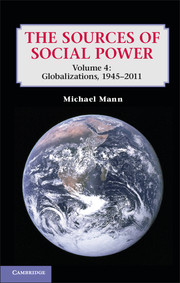Book contents
- Frontmatter
- Contents
- 1 Globalizations
- 2 The postwar global order
- 3 America in war and cold war, 1945–1970
- 4 U.S. civil rights and identity struggles
- 5 American empire during the cold war, 1945–1980
- 6 Neoliberalism, rise and faltering, 1970–2000
- 7 The fall of the Soviet alternative
- 8 The Maoist alternative reformed
- 9 A theory of revolution
- 10 American empire at the turn of the twenty-first century
- 11 Global crisis
- 12 Global crisis
- 13 Conclusion
- Bibliography
- Index
12 - Global crisis
Climate change
Published online by Cambridge University Press: 05 January 2013
- Frontmatter
- Contents
- 1 Globalizations
- 2 The postwar global order
- 3 America in war and cold war, 1945–1970
- 4 U.S. civil rights and identity struggles
- 5 American empire during the cold war, 1945–1980
- 6 Neoliberalism, rise and faltering, 1970–2000
- 7 The fall of the Soviet alternative
- 8 The Maoist alternative reformed
- 9 A theory of revolution
- 10 American empire at the turn of the twenty-first century
- 11 Global crisis
- 12 Global crisis
- 13 Conclusion
- Bibliography
- Index
Summary
Introduction: Three villains: Capitalism, states, citizens
Volumes 3 and 4 have charted the growth of globalization processes. In Volume 3 I dealt with the “segmented globalization” of rival empires and with the Second Industrial Revolution, which diffused new industrial technologies through larger swathes of the world. I analyzed the crises posed for most of the world by two World Wars and a Great Depression and noted the diffusion of liberal, socialist and fascist ideologies. In this volume I have charted the further global diffusion of capitalism and nation-states, and the coupling of a decline in international wars and a growth of civil wars across the globe. Yet in truth the global dimension of all this was not particularly interesting from a sociological point of view. For the most part I was merely describing the global expansion of social structures long familiar to us on more local scales. Does capitalism change because it is global rather than regional? Do geopolitics change because they concern 190 nation-states rather than 30? Yes, but not greatly.
However, a major exception was noted in Chapter 2. The emergence of international peace across most of the world was a world-historical change come quite suddenly upon us. This happened for several reasons, but the major one was the threat of nuclear weapons to the globe. This made warfare between the greatest powers completely and utterly irrational. The use of nuclear weapons could be the most extreme form of globalization. They could cause many millions of casualties, ending civilization as we know it, making the world uninhabitable for humans. Insects might inherit the earth. Military power relations had become fully globalized, for they had hit up against the limits of the earth and then ricocheted back on us. Perhaps the most appropriate metaphor is a lethal boomerang, our own inventions coming back to kill us. But humans took evasive action against nuclear war and this transformed societies. There has never been an entity like the European Union, an economic giant but a military dwarf. On a lesser scale many other states show the same novel imbalance, their civilian far outweighing their military functions. The military backbone of most states has turned to jelly, and for them soft have largely replaced hard geopolitics.
- Type
- Chapter
- Information
- The Sources of Social Power , pp. 361 - 399Publisher: Cambridge University PressPrint publication year: 2012



